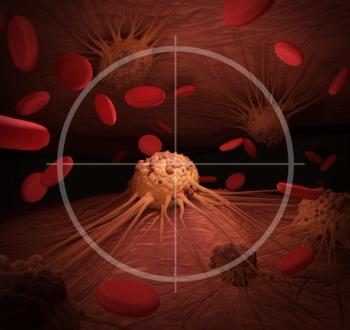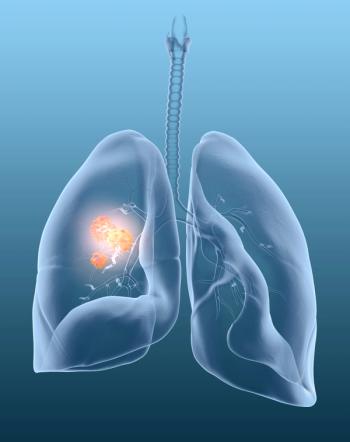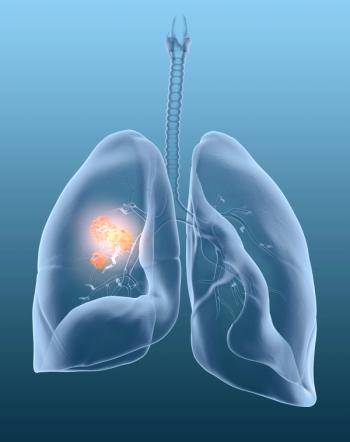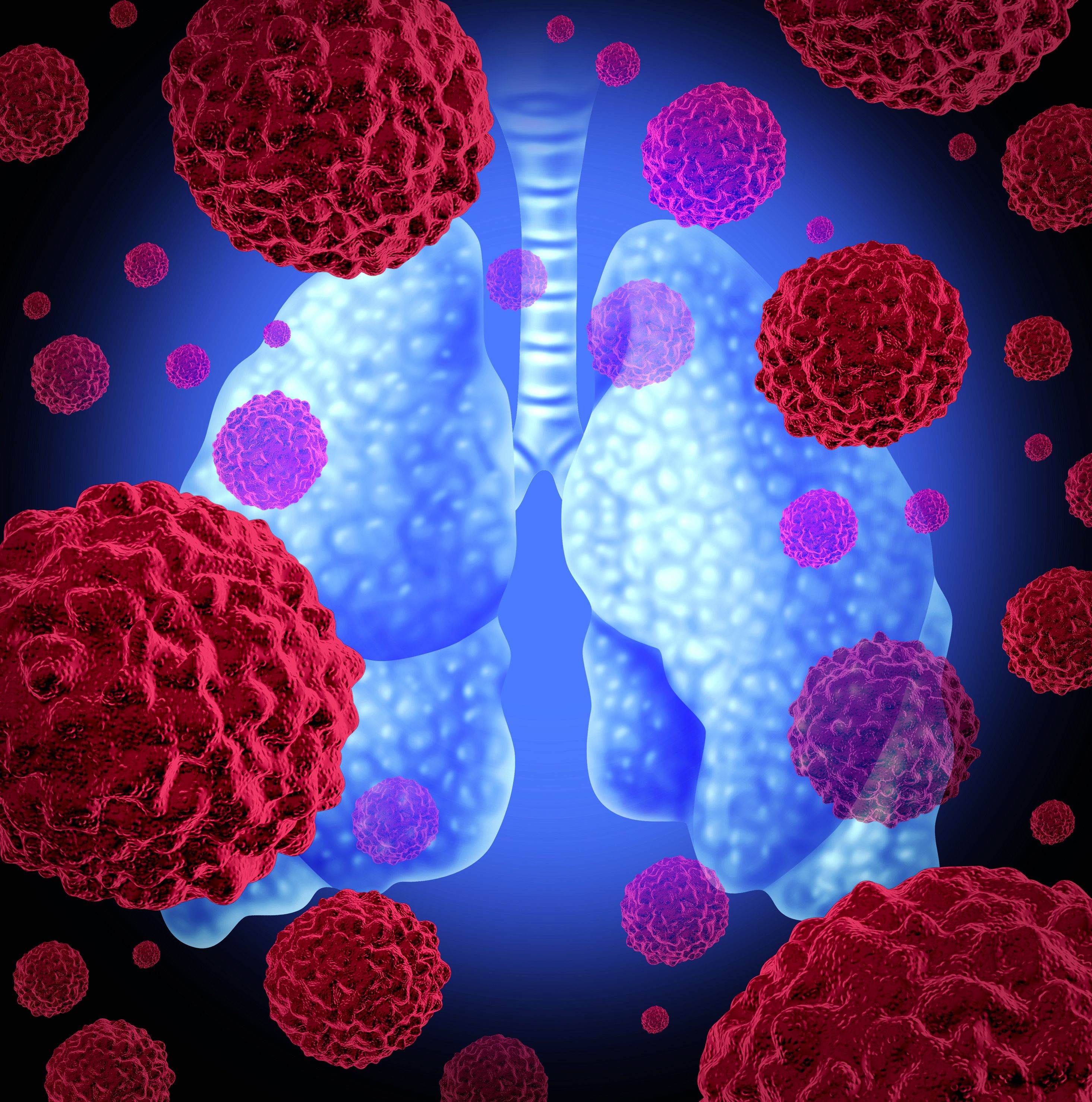
Lung Cancer
Latest News

Latest Videos

More News

The results for the phase 2 SUMMIT trial examining neratinib to treat patients of metastatic non-small cell lung cancer (NSCLC) were recently announced by Puma Biotechnology.

Study Strengthens Case for SBRT Use in Oligometastatic Neoplasia to the Lung
This study indicated that patients with up to 3 lung metastases from primary tumors in other sites who were treated with stereotactic body radiation therapy fared comparably well whether their radiation was delivered in 1 or 4 treatment sessions.

This study found that fragment analysis had the ability to detect large MET exon 14 skipping deletions that were missed by next-generation sequencing in non-small cell lung cancer tumor samples.

The FDA approved expanded claims for the cobas EGFR Mutation Test v2 as a companion diagnostic for a broader group of therapies in the treatment of non-small cell lung cancer.

The FDA granted priority review to the supplemental biologics license application for cemiplimab-rwlc (Libtayo) as a first-line treatment for patients with locally advanced or metastatic non-small cell lung cancer with 50% or more PD-L1 expression.

The FDA accepted and granted priority review to the supplemental new drug application for osimertinib (Tagrisso) for the adjuvant treatment of patients with early-stage EGFR-mutated non-small cell lung cancer after complete tumor resection with curative intent.

Merck announced positive data regarding 2 studies, one examining pembrolizumab in combination with chemotherapy and another in combination with quavonlimab in combination to treat advanced non-small cell lung cancer.

This study found that single dose-per-cycle plinabulin has a similar neutropenia protection benefit as pegfilgrastim among adult patients with non-small cell lung cancer.

Significantly more patients treated with nivolumab (Opdivo) plus chemotherapy before surgery demonstrated no evidence of cancer cells in their resected tissue in the trial compared to those treated with chemotherapy alone.

The study is evaluating sotorasib in 126 patients with KRAS G12C-mutant advanced non-small cell lung cancer who had failed a median of 2 prior lines of anti-cancer therapies.

A study found that the historically higher lung cancer incidence rates for young Blacks compared to Whites in the United States disappeared for men and reversed for women.

A pooled analysis of 3 randomized controlled trials found that pembrolizumab plus chemotherapy demonstrated response and survival improvements with a manageable safety in comparison with chemotherapy alone in PD-L1‒negative advanced non-small cell lung cancer.

FDA Approves Nivolumab Plus Ipilimumab for Previously Untreated Unresectable Malignant Pleural Mesothelioma
The agency approved the first and only immunotherapy treatment as a first-line therapy for adult patients with unresectable malignant pleural mesothelioma.

The findings from this global, open-label, randomized trial supported the FDA approval of atezolizumab for patients with non-small cell lung cancer with high PD-L1 expression, regardless of histologic type, in May.

PORT Not Recommended as Standard of Care for Completely Resected Stage IIIAN2 NSCLC
Post-operative radiotherapy was associated with a nonstatistically significant increase in disease-free survival in patients with completely resected stage IIIAN2 non-small cell lung cancer and therefore cannot be recommended as a standard of care.

Sotorasib Demonstrates Promising Antitumor Activity in Advanced NSCLC
Sotorasib showed promising antitumor activity in patients with non-small cell lung cancer that harbor the KRAS p.G12C mutation.

Cemiplimab-rwlc (Libtayo) monotherapy led to a significant improvement in overall survival and progression-free survival in patients with advanced non-small cell lung cancer with PD-L1 expression on at least 50% of their tumor cells.

Osimertinib Found to Reduce Risk of CNS Death or Progression in Early EGFRm NSCLC
Based on these data, researchers indicated that adjuvant osimertinib would be an effective and practice-changing treatment in this setting.

Frontline Apatinib/Gefitinib Combo Improves PFS in EGFR-Mutant NSCLC
Apatinib in combination with gefitinib in the first-line setting demonstrated superior progression-free survival (PFS) in patients with advanced EGFR-mutant non–small cell lung cancer.

Frontline Lorlatinib Improves PFS in Patients with Advanced ALK-Positive NSCLC
First-line treatment with the third-generation ALK TKI was also associated with higher overall and intracranial response rates in patients with ALK-positive non–small cell lung cancer.

Capmatinib (Tabrecta) demonstrated substantial antitumor activity in patients with advanced non-small cell lung cancer with a MET exon 14 skipping mutation, especially in those not treated previously.

The approval was based on results from the phase 1/2 ARROW clinical trial, which demonstrated efficacy for pralsetinib in patients with RET fusion-positive NSCLC with or without prior therapy, and regardless of RET fusion partner or central nervous system involvement.

The model was found to be superior to the United States Preventive Services Task Force (USPSTF) criteria at identifying African American ever-smokers for lung cancer screening.

Results from this trial observed in patients with RET-altered lung and thyroid cancers also led to the approval of selpercatinib by the FDA in May for this indication.

The new drug application was based on results from the pivotal ongoing, single-arm, phase 2 VISION study evaluating tepotinib monotherapy in patients with advanced NSCLC with METex14 skipping alterations.























































